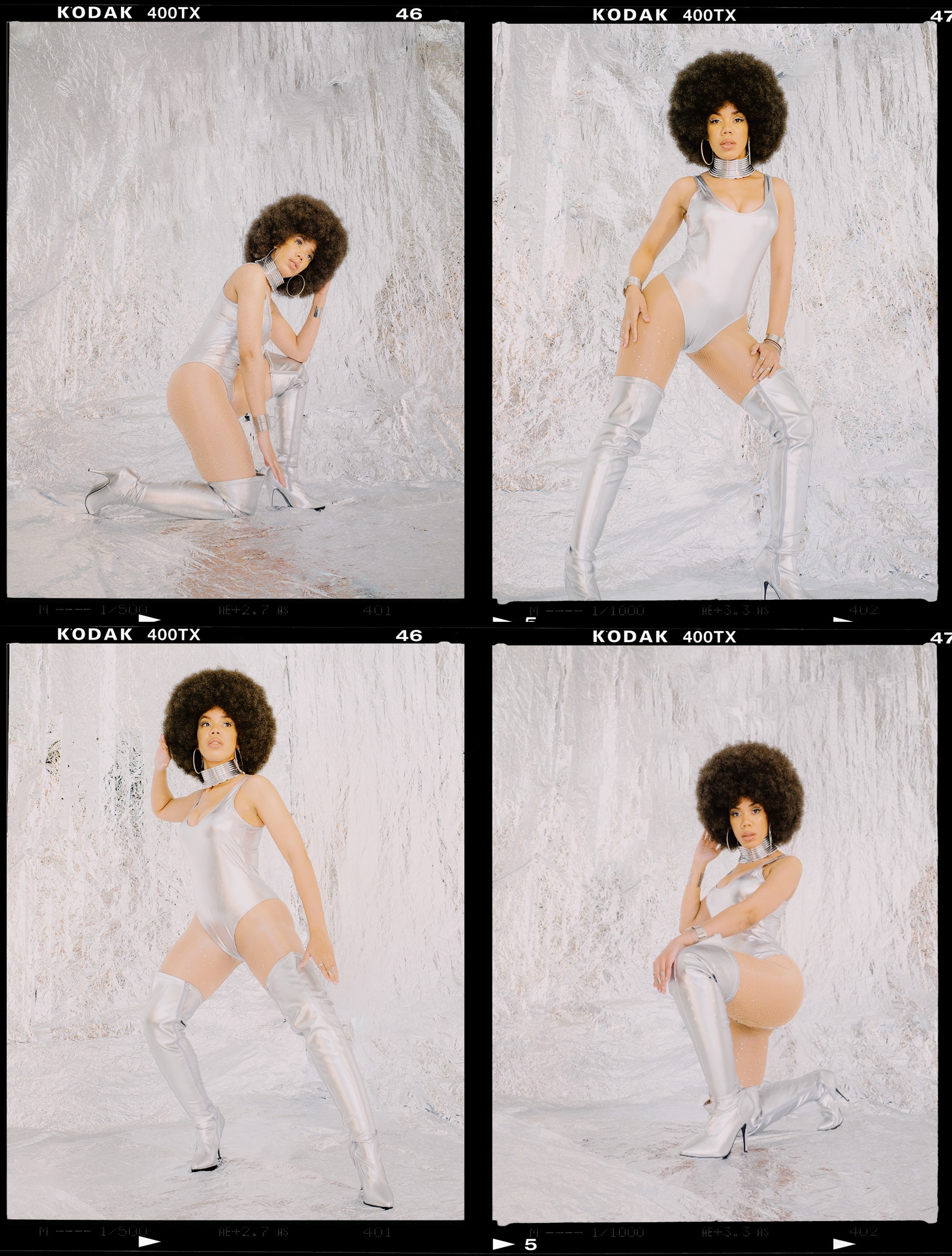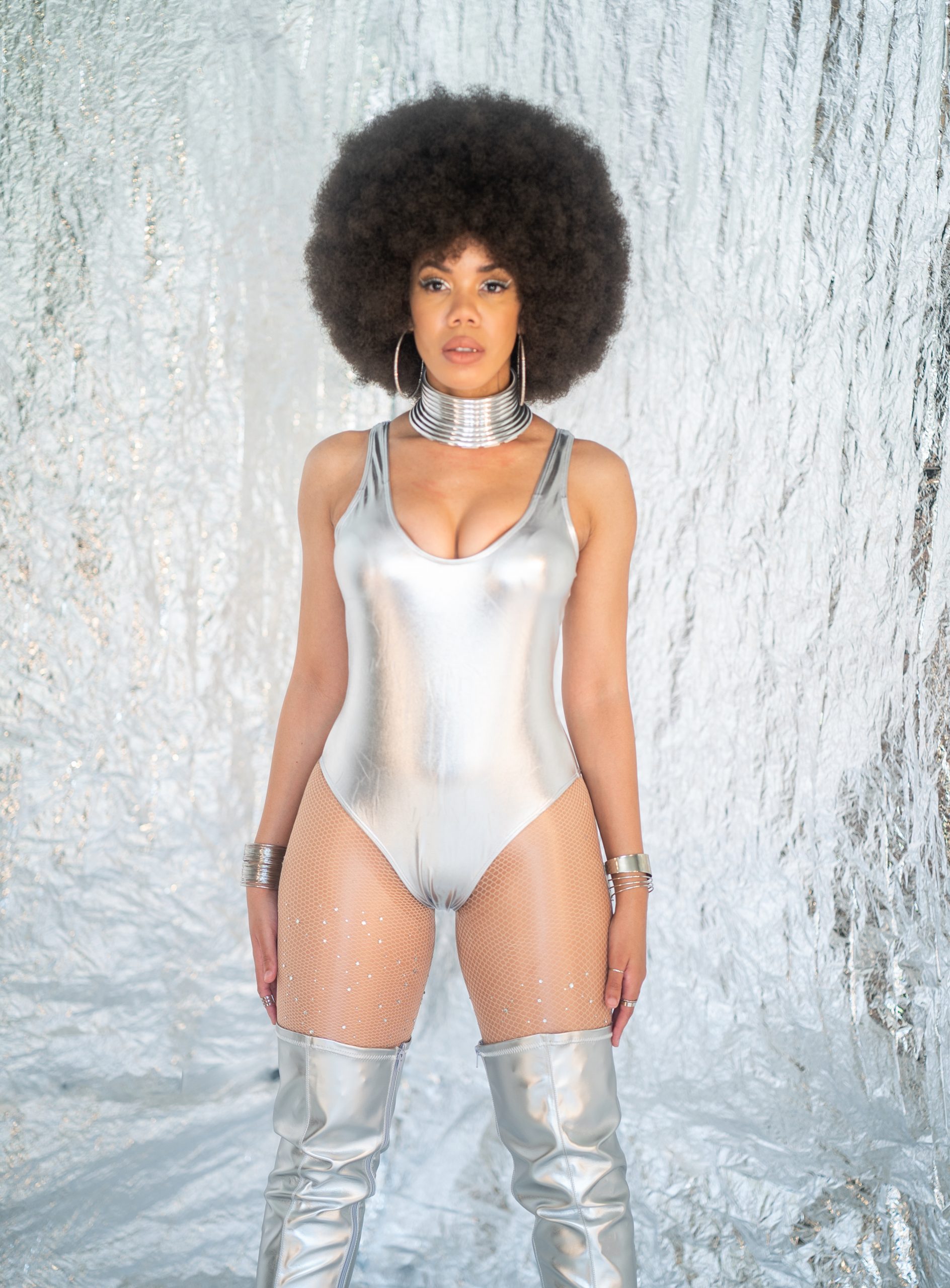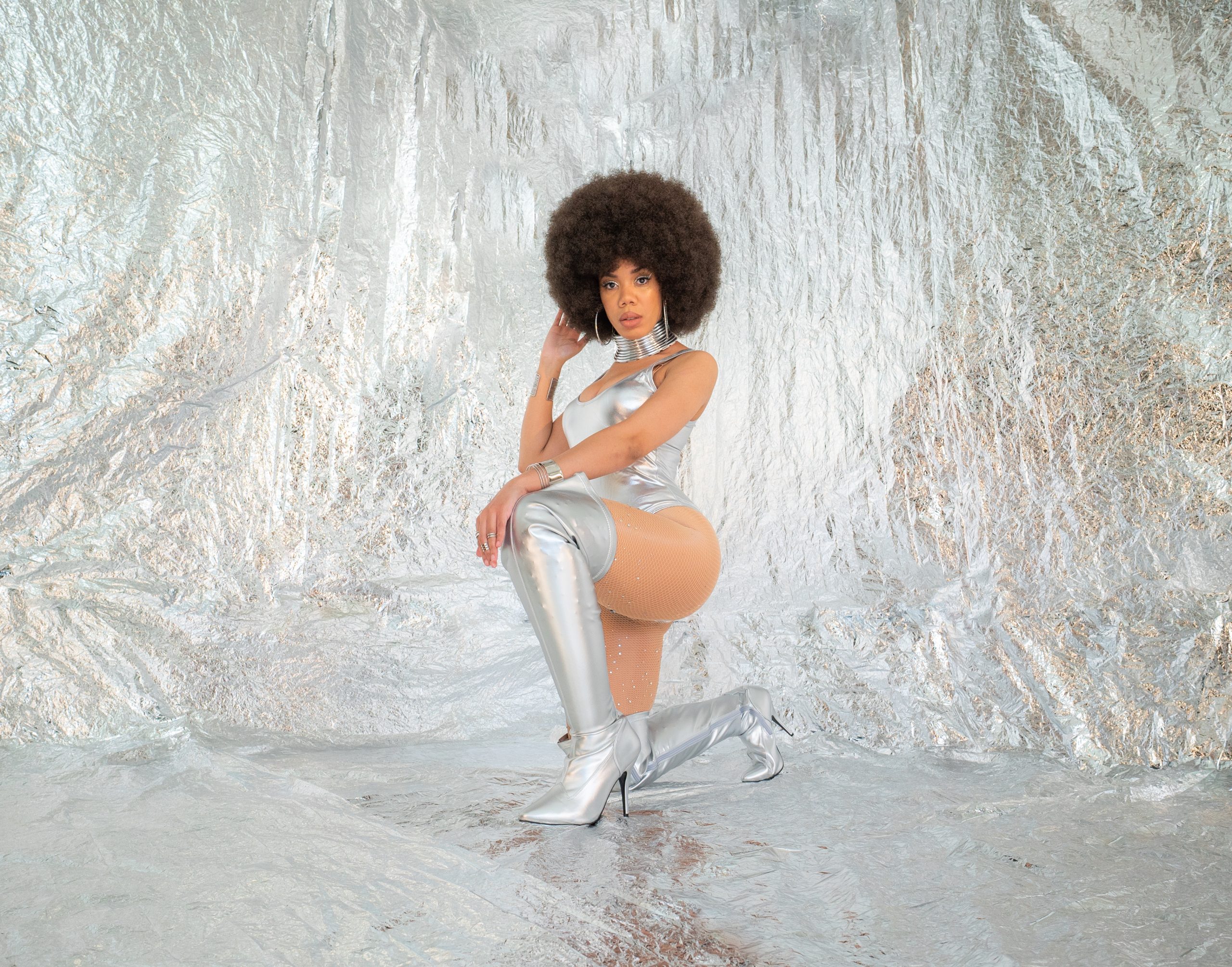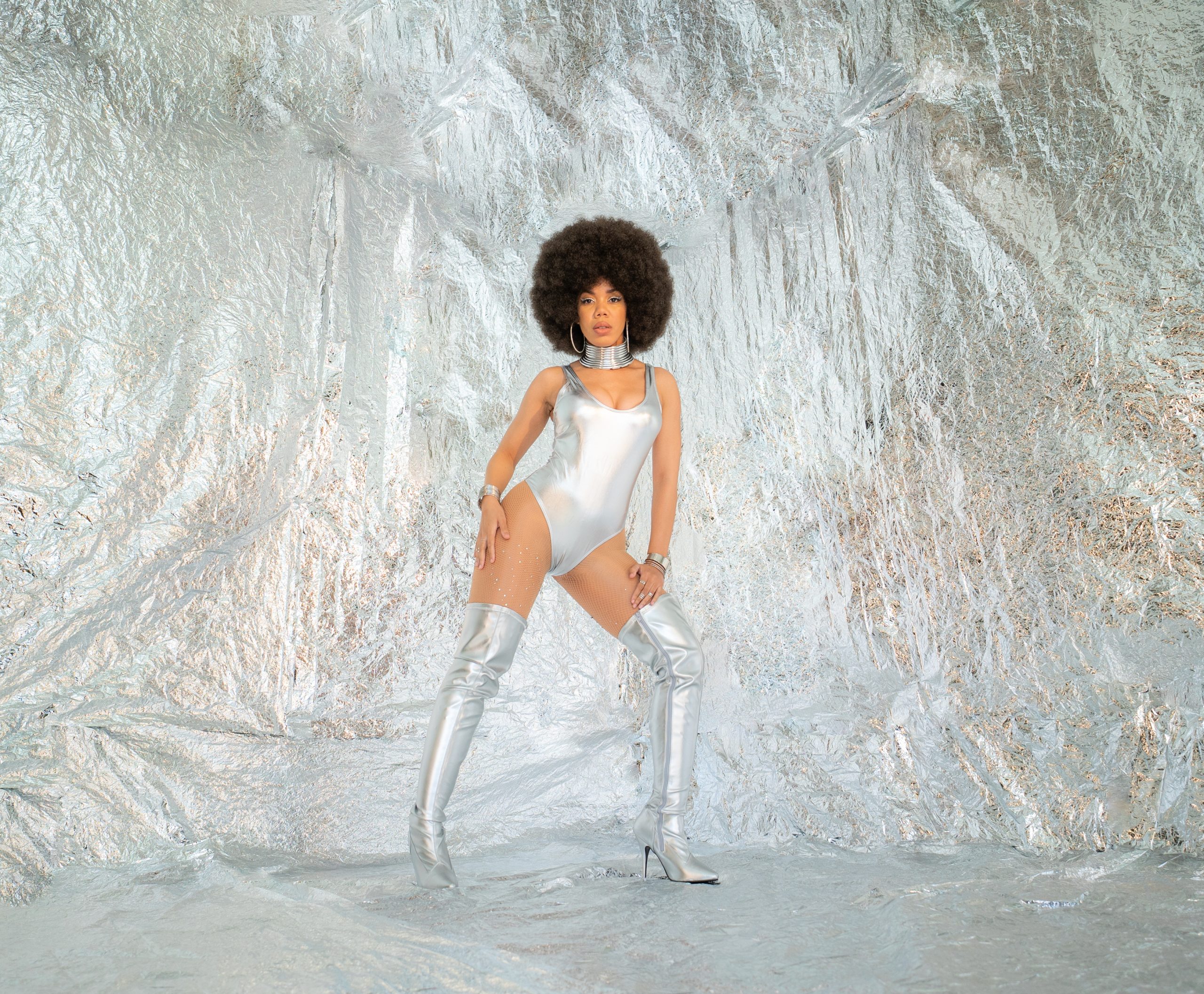
As we move further into 2020 with the wide resurgence of the Black Lives Matter movement, long-held societal standards and their prejudiced undertones become more and more apparent. Take the eurocentric standard of beauty, one that is grossly misrepresentative of the population at large or the existence of colorism across the globe, toting the strikingly illogical idea that the amount of melanin in our skin has anything to do with our natural abilities. Many would reject these racist nuances at face value without question, but as we peel back the layers of our subconscious, we see how deeply imbedded racism has become in our collective psyche.
Here to further explore the Black experience in America is the self-proclaimed granddaughter of soul, KIRBY. First to admit that she is the opposite of an overnight success, KIRBY made her start in music as a songwriter, penning tunes for the likes of Beyonce, Kanye West, Rihanna, Paul McCartney, Demi Lovato, Ariana Grande, etc., before deciding to embark on her own path. Gifted with a voice and message that are meant to be heard, with a nudge from coveted mentor, friend, and R&B legend Brandy, KIRBY made the decision to no longer ignore her artistic vision and reach for those stars of which she is worthy.
Memphis born and Mississippi bred, like many Christian-Southern children KIRBY found her gift for song in church. A member of a tight-knit (and very large) family, she was encouraged to shine brightly and unapologetically throughout her youth. Though confident by nature, KIRBY too felt the sting of living life as a Southern, Black woman filtered through the white gaze. It wasn’t until far past her adolescence when she began to make the connection that she had subconsciously internalized the notion that “white is right,” and with these realizations came the greater conclusion to refuse to compromise her Blackness once and for all.
Cue the release of her 2020 debut EP ‘Sis.,’ a powerful testament to female empowerment through the lens of finding the purest form of love, KIRBY breaks down the barriers, sanctioning a personal connection from artist to listener. The seven-track EP is a soulful delight, comparable to the best hug in the world or the most comforting of Southern comfort food, KIRBY allows her listeners to find inspiration through the power of vulnerability and human connection. Picking up steam in the past six months since it’s release, KIRBY has seen an overwhelming wave of support including partnering with Converse for their latest campaign with the release of an exclusive, new record “I Love Me Too,” being named a Rising Spotlight Artist by Tidal with a short documentary on her career to date, and recent collaboration with Lucky Daye on a remix of her song “Velvet” for the fourth season of ‘Insecure.’
A beautiful human being inside and out, I had the profound gift of conducting an hour-long phone-interview with KIRBY. Warm and inviting, the openness one feels listening to her catalog directly translates to how she interacts with people. A highly educational and uplifting experience, KIRBY discusses everything from childhood, how pain can manifest into strength and her message of never compromising the beauty of Blackness.
What was KIRBY like as a kid?
You know what I thought of when you asked me that question? I remember being in my teacher’s car, I must have been in like 2nd grade, and singing the lyrics to Lil’ Kim’s “Crush On You” like line by line… and I was thinking “First of all, why am I in my teacher’s car? And second, why do I know all the lyrics to Lil’ Kim at such a young age?” (Laughs) Anyway, my family was so great at every gathering, always creating some sort of stage, some sort of “Come on Kirby, sing! Come on Kirby, perform!” And they let me sing Mary J Blige at my sister’s birthday party or Toni Braxton. I had six aunts and uncles, just on my Mother’s side, I have like eight on my Dad’s side, so any time we would get together, we would just have these mini concerts for me. So my childhood, thank God, I have really really really fond memories. I think as you get older you lose that sense of being able to be free and not judge yourself. I had a very non-judgement childhood, and I think it allowed me to think I can do anything… My parents and my aunts and uncles, they were just a really great Black, Southern, loving family.
Tell us about the first moment you realized you had a gift for music?
I went to a very very small church, maybe 30 people on a good Sunday and half of those people were my cousins. My sister would be playing piano, my mother was over at Sunday school, so I think when I started to sing in Sunday choir and I would be the youngest one leading the choir backed by all the adults, I think that was the time I realized like “Oh, I guess I can sing…” But never did I even think once, especially coming from Mississippi, that I was going to be a singer, like what does that even mean? What does that actually look like? (Laughs) Man, I’m still kind of wondering what that actually looks like, but every day it gets a little clearer that you can actually be the person you dreamed of being as a kid.
I miss my family, I miss the food. The thing about the South is that it’s just so polite, you know? When you walk anywhere down South everybody’s like “How are you doin’?” Like when you go to the mailbox and somebody drives their car by, they are going to lift up their hat, they’re going to wave. You know what I’m saying? Like, I don’t have to know you to have a conversation with you. I feel like that’s the beauty of the South.
What could you do without?
I’m from a very red state, I believe we had a Trump rally three miles from my parents’ home. It’a segregated, very much so still, it wasn’t until recently when I started really thinking back onto high school and how I grew up and how so much of what I thought about myself was based on how much life mirrored my white friends that I realized, “Wow, I have grown up literally thinking white is right.” So if my hair isn’t straight hunny, that’s not right. If I’m not speaking a certain way, that’s not right, and it wasn’t questioned. The more that I mirrored my white friends, the better off society told me I was, especially in the South… there’s a lot that I had to unlearn that I thought was right in high school. Ever since everything started happening again with Black Lives Matter, I’ve had to evaluate my past and really kind of break down… some of the conditioning that was happening in my teenage years that I didn’t even know I was experiencing.
You first had your start in the industry as a songwriter, penning tunes for the likes of Beyonce, Kanye West, etc. What was the tipping point that led you to pursue your own artistry?
I just remember having such a sadness with everything that was going on and I remember thinking “What is wrong with me? These are huge moments girl, you should be happier!” And I think it was because, as grateful as I was to work with those people, I wasn’t singing and for me, music has always been about not just writing, it’s singing and writing. I remember… The first time I met Brandy, I came to her house and I played a song for her and she said “So, why aren’t you singing it?” That was the first time that an artist had ever acknowledged that I even had the ability to sing and could possibly be an artist as well… Then I did a session with Christina Aguilera and she asked me the same thing… and I think that’s when I knew I had to try something different…

Do you still write for other artists?
I finally got to a point where I could because we finished the record, I’ve got my producers, and I realize it’s a balance for me. I LOVE to still write for other people, especially when you can write for people and it’s collaborative. You become a better artist when you know who you aren’t and I feel like sometimes being a songwriter allows you to do things that you wouldn’t feel comfortable doing as an artist because it just isn’t you. There’s something to be said about being able to go into a room and kind of transform and write for someone like Lizzo. WHICH I’M GOING TO SPEAK INTO EXISTENCE BECAUSE I WANT. TO WRITE. FOR LIZZO! I want to be best friends with Lizzo, that’s what I need to post on my Instagram next, listen, me and Lizzo (laughs)… The first session I had when I got back was with John Legend and he actually took the song we wrote for his next album, so I’m really grateful that I can go back to doing both now that I don’t feel like it’s a compromise.
On the subject of speaking things into existence, word on the street is that you have a knack for that (i.e. your recent placement on ‘Insecure’ and collaboration with Lucky Daye… def peeped the IG). Do you think we can actually manifest our own reality?
I’ve always been a person of vision boards, speaking over your life, speaking into existence what you believe God has for your life. But when I tell you when I moved back to Mississippi I was doing the same thing, I would be speaking and saying those same things and things weren’t happening. I feel like sometimes, when things start manifesting in people’s life and their prayers start being answered and then they don’t see those same things happening in the next person’s life, people are sometimes tempted to be like “Oh girl, you must not be manifesting,” but really what prayer and speaking things into existence does for me is retrain my subconscious to believe that I’m worthy… So I think the best power of “manifesting” is that you really retrain your mind to believe that it’s possible… I can’t really say I manifested it, I think it was God’s divine timing… I believe timing is everything and sometimes it’s not happening just because you’re not ready… There have been things that I personally wanted so bad and if they would have happened at the wrong time, I wouldn’t have been ready for it or it would have blocked something better.
Tell us about a moment of pain in your life that metamorphosed into profound strength.
That’s a great question… This sounds a little dark, but death has always kind of been the paradigm shift in my life. Most recently last year, I was living in Mississippi, and my Dad lost his brother, nephew and sister in three months, it was crazy… unexpected deaths and I remember being in New York and I was in this hotel room and I felt such a fear like, I don’t know anybody in the city, I think it was just grief overcoming me and being in a city by myself again, but I remember God tapped me on my shoulder and said, “It’s time for you to move” because I had gotten comfortable… I was back in Mississippi and everywhere I went I had family and something to lean on and I think just being in that hotel that weekend in New York and you know, having the experience of losing loved ones that year, I just had to make peace with the aloneness in a way that I didn’t have to face when I was in Mississippi because I have the crutch of having family and I knew then, I was like “You have to face that LA fear. You need to take the confidence that you gained by finding yourself again and now you need to go back to the place that you ran away from… because it’s not until you go back that you will realize how strong you are.” Death is just one of those things that shakes me up and reminds me that you don’t have forever to do this, the time is now.
What was your first experience with racism in your life?
What I don’t remember and I want to learn to remember is… when I was subconsciously trained that white is right, like the way I should look or my hair or having a keener nose, I just don’t know when that became the standard of beauty for me as a kid and when colorism really came to play. Maybe it was the toys because I definitely grew up with a lot of Barbie dolls, but I also had an Addy Walker doll who is like the Black American Girl that was a slave and now that I look back on it, I’m like “Okay, so the only doll that I could have was a slave doll?”… Lots of little things like that… subconsciously taught me that the holy grail to beauty, the holy grail to success is white, so if you look closer to your white counterparts, you’re doing life right. I don’t know when that happened, I think it’s just ingrained in the South and the fabric of the school system… I didn’t even have a Black teacher until college… You’re not aware of it as a kid, but when you get older, you start pulling back layers and you realize, “Wait, did that train my mind to think that intelligence looks white?”
I remember one time, I was riding the bus and this white boy spit on me and when I told my mom, she withdrew me from school. I must have been in 3rd grade, I’ve repressed a lot of those memories, but because of what’s going on I’ve had to really think about what my experience with racism has been personally. Just the other day my mom was driving and this guy was blowing at her and I guess she didn’t go fast enough and he rolled up next to her and called a n****… This stuff still happens, like Confederate flags on pickup trucks in Mississippi? That’s one in five. I’ve grown up accustomed to it, so for someone like me I almost have to dig extra hard because so many things that are not right, you grow up thinking “Well this is just the way of life.” I’ve started the work, but I feel like I’m just at the tip of the iceberg when it comes to what the racial experience has been in my life… The compromise is overwhelming when you really start to realize how much of your daily life, your work life, your beauty, your perception of success has been filtered through a white gaze and how much you have to compromise yourself just to get a seat at the table… so we’ve got to find a way to build our own table.

How has the resurgence of the Black Lives Matter movement in popular media today affected you personally?
I’ll tell you something positive because we’ve talked a lot about white privilege and white people not understanding. Now all the producers on my EP are white, that just so happened, and I will say that I’ve had really great experiences when I’ve walked into the room as Black woman and I’m working with white guys, I’ve never felt like I was being looked at a certain way. I really do believe that music has a certain way of allowing people to get out of themselves and really just treat people as people, I really really believe that. Last week I had a lot of conversations with non-person of color, especially white men, about questions they had and I think that’s really where the healing starts… I look forward to the day that you don’t have to yell Black Lives Matter, that as soon as you see a Black person, you see yourself in them… I think when you see yourself in other people’s pain, it eradicates racism because it becomes personal, it becomes your pain…
But with this Black Lives Matter movement, what is had done for me personally is force me to take a look at how much of my life has been about compromise and how much I’m no longer willing to compromise myself, my beauty, my Blackness in order to be accepted and to know truly, truly at the core of my heart that I don’t have to.
In your opinion, what is the most important way white people can be active allies in the Black Lives Matter movement?
Mmm, that’s a great question. I believe listening is really important. I also have seen a lot about not expecting Black people to help you understand your privilege and that that’s a responsibility that you have to take, and I think that’s fair. I shouldn’t have to help you undo the racism that I didn’t start, I don’t think that’s my responsibility, you have to do the work. But I think listening and also, look around at your circle of friends and if your circle is only looking like you, it’s probably going to be very hard to check yourself daily on your privilege and any type of subtle racism that you might be dealing with… You need people in your life that don’t look like you and can check you on certain thing… I think it’s important to really have some hard conversations because it’s not until you speak these things out loud and ask your questions out loud that we can really have a dialogue on what change looks like and what Black Lives Matter looks like on the daily…
What is your message for Black girls growing up today?
Kind of going back to who Kirby was as a kid, I just didn’t see anything wrong with me, it wasn’t until I got out into the world that I realized my lips are bigger than everybody else’s or my hair doesn’t really straighten like that. And let me be very clear, not only did I get that from my white friends at school, I would get made fun of about my Black features from my Black friends, Black men. I feel like it’s so important to really believe that you are enough, that you more than matter, that we’re powerful, that we’re beautiful, that we’re worthy. That’s what manifesting really is, it’s speaking to your worthiness… I’m alive, I’m breathing, I’m worthy.

